diction
措辞的用法diction
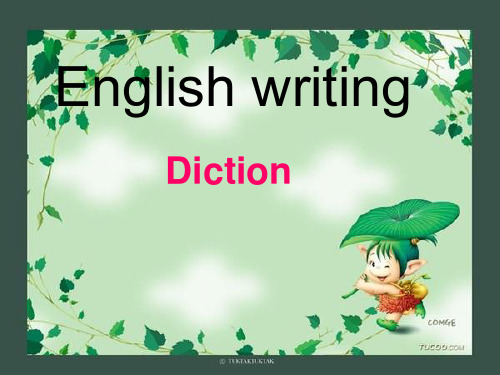
Colloquial Words
• You have your tension. Sometimes you come close to having an accident, that upsets you. You just escape maybe by a hair or so. Sometimes maybe you get a disgruntled passenger on there, and starts a big argument. Traffic. You have someone who cuts you off or stops in front of the bus. There’s a lot of tension behind that. You got to watch all the time. You’re watching the drivers, you’re watching other cars. Most of the time you have to drive for the other drivers, to avoid hitting them. So you take the tension home with you.
Common words
• When I was a kid, and reading every science fiction book in the local library, I used to wonder exactly how the future would happen. By that I don’t mean what the future would be like —— science fiction already told me that —— but rather how we’d actually get there. Science fiction books seemed to agree, for example, that in the future there would be no money —— all transactions would be made via identity cards and centralized computers. But that seemed dubious to me: how, I wondered, are you going to get everybody to give up money in the first place?
Chapter 2 Diction
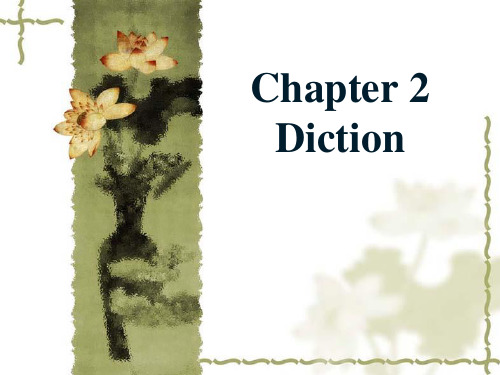
❖ 4. Equivalents Interwoven with One Another say, speak, talk, tell 说、讲、谈、诉
❖ 5. Words Without Corresponding Equivalents teenager: 13至19岁的青少年 cyberslacker: 利用工作时间在公司上网、做与工作 无关的事情的雇员
❖ The tasks carried out by them are praiseworthy. ❖ 他们进行的事业是值得赞扬的。
❖ I always considered him calculating and mercenary and did my best to avoid him.
❖ 我一向认为他这个人工于心计又唯利是图,所以总 是尽力设法避开他。
❖ propaganda : false or partly false information used by a government or political party to make people agree with them.
❖ Publicize: If you publicize a fact or event, you make it widely known to the public.
❖ 词语的选择是指在翻译过程中,基于对源语文 本的精确理解,在目的语中选择恰当的词语或 表达法,使之符合译文语境的表达需要。
Diction (Choice of Words)
❖ “The meaning of a word is its use in the language.” ❖ “Each word, when used in a new context, is a new
翻译技巧4 措词、具体化、词类转换
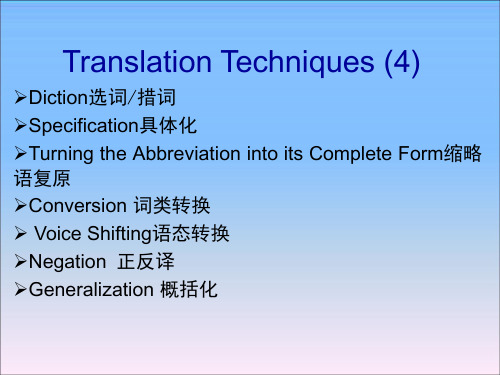
• 在西南地区广西、贵州、湖南、四川等省份,“吊脚楼”是 山乡少数民族如苗、侗、壮、布依、土家族等的传统民居样 式。尤其在黔东南,苗族、侗族的吊脚楼极为常见。这里的 自然条件号称“天无三日情,地无三里平”,于是山区先民 创造出了独特的“吊脚楼”。 • 吊脚楼依山而建,用当地盛产的杉木,搭建成两层楼的木构 架,柱子因坡就势长短不一地架立在坡上。房屋的下层不设 隔墙,里面作为猪、牛的畜棚或者堆放农具和杂物;上层住 人,分客堂和卧室,四周向外伸出挑廊,可供主人在廊里做 活和休息。廊柱大多不是落地的(便于廊下面的通行无碍), 起支撑作用的主要是楼板层挑出的若干横梁,廊柱辅助支撑, 使挑廊稳固地悬吊在半空,这种住宅因其外形和结构特点被 称为“吊脚楼”。吊脚楼的优点明显,人住楼上通风防潮, 又可防止野兽和毒蛇的侵害,这种住宅在西南山区至今仍有 建造。
• When a common word is turned into a proper noun, the meaning is narrowed accordingly such as the City, which means the “business centre of London”, the Peninsula, which refers to the “Iberian Peninsula”, and the Prophet, which stands for “Mohammed”.
d开头的词根

D开头的词根dict,dic=say 表示“说话”dictate v 口授;命令;听写(dict+ate说话→口授,命令)dictator n 发命令者;独裁者(dictate+or→发命令者)diction n 措词;词语的选择(dict+ion→说话状态→措词)dictionary n 字典(diction+ary→措词的书→字典)dictum n 格言;断言(dict+um→说[出]的话→格言)benediction n 祝福(bene好+dict说+ion →说好话)malediction n 恶言;诅咒(male坏+dict+ion→说坏话)contradict n 反驳;否认(contra反+dict→反说→反驳)contradictory a 矛盾的,对立的(contradict反驳+ory)edict n 法令;布告(e 出+dict说→说出→布告、法令)jurisdiction n 司法权(juris 司法+dict+ion→说法律的→司法权)predict v 预言;预告(pre预先+dict)prdeiction n 预言;预告(predict+ion)indict v 起诉,控诉(in进去+dict→进去说→起诉)indictment n 起诉,控诉(indict+ment)abdicate v 放弃;退位(ab离开+dic 说,命令+ ate→不再命令→退位)dedicate v 献身于,致力于(de加强+dic说+ate→再说→努力献身)indicate v 指示;表示(in进入+dicate→说进去→指示,指明)vindicate v 辩护;拥护(vin力量+dic说+ate→用力量说→拥护)vindictive a 有报复心的(vin力量+dict说+ive)addict v 耽溺,上瘾(ad一再+dict说→说了还说→耽溺)addicttion n 耽溺,嗜好(addict+ion)interdict v 禁止n. 禁令(inter在中间+ dict→在中间说,不让做→禁止)valediction n 告别赠言(vale再见+dict +ion →说再见)verdict n 裁判,判决(ver真实+dict→说真实话→裁决)predicate v 断定,认定(pre+dic+ate→预先说→断定)prdedication n 认定,断定(predicate+ion)predicament n 困境,险境(pre预先+dica命令+ment→预先命令做→进入危境)indite v 撰写,写作(in进入dite[=dict]→说进去→写进,写作)dent=tooth表示“牙齿”dentist n 牙科医生(dent+ist人)denture n 假牙(dent+ure)indented a 锯齿状的(in进入+dent+ed→进入牙齿状→锯齿状的)dent n 凹痕(像牙咬出的印痕)indenture n 契约,合同(in+dent+ure→古代契约锯成锯齿状,一分为二,一人一半)edentate a 无齿的n. 贫齿兽(e出;无+dent+ate→无齿→贫齿兽)derm,dermat =skin表示“皮肤”dermal a 皮肤的(derm+al)dermatitis n 皮炎(dermat+it is炎症)dematologist n 皮肤病学家(dermat+ologist学者)hypoderm n 皮下组织(hypo在…下面+derm)epidermis n 表皮,外皮(epi在外面周围+dermis 外皮)dign=worthy,noble表示“值得,高贵”condign a (惩罚)值得的,应得的(con大家+dign值得→大家都觉得该惩罚)dignity n 威严,庄严(dign+ity)dignify v 使…高贵(dign+ify…化)dignitary n 高贵之人(dign+itary表示总称人→高贵之人)indignity n 轻视;侮辱(in 不+dign+ity →不高贵)indignant a 愤慨的,愤怒的(in 不+dign+ant→不高贵的→愤怒是不高贵的)indignation n 愤怒的(由indignant变化而来)doc,doct=to teach表示“教”doctor n 博士,医生(doct教+or→教的人→有学问的人→博士)doctoral a 博士的;权威的(doctor+al)doctrine n 教义,教条(doctr+ine→教的东西→教条)doctrinaire n 空谈家a.教条的(doctrine+aire人→教条之人)docile a 可教的;温顺的(doc+ile能…的→能教的)indioclie a 难驯服的(in不+docile→不可教的)document n 文件;证书(docu[=doc教]+ment→用来教的东西→文件)don,dit=give表示“给予”donate v 捐赠(don+ate→给出去)donor n 捐献者(don+or→给的人)condone v 原谅,宽恕(con共词+done→共同给出不加追究→原谅)pardon v 原谅,宽恕(par平等+don→给予平等→原谅)antidote n 解毒药(anti反+dote[=don]→给出反[毒]→解毒药;anecdote n 短故事;轶事(anec未出版+dote_说出来的未出版的故事)condition n 条件(con共同+dit+ion→共同给出的[条件])tradition n 传统;传说(tra横+dit+ion→横着给,代代相传→传统)edit v 编辑(e 出+dit→给出好文章→编辑)editorial a 编辑的n.社论(editor 编辑+ial)rendition n 给予;移交(rend 给+dit给+ion_给出_→给予参考;render给予)extradite v 引渡(逃犯等)( extra向外+dite向外给→引渡)extradition n 引渡(extradite+ion)du,dub,doub=two表示“二,双”dual a 二重的,二元的(du+al)duality n 二重的性(dual+ity)duel n 决斗(du+el[=bell斗]→二个人斗→决斗)dubious a 半信半疑的(dub+ious_二种状态→不肯定,怀疑的)indubitable a 无可置疑的(in不+dubitable可怀疑的)doubt n 怀疑(doubt二→二种状态→怀疑)doubtful a 可疑的,怀疑的(doubt+ful)duplicate v 加倍;复制(du+pic 重复+atc→重复第二份→复制)duplicity n 二心;口是心非(du+plic重复+ity→二种重复状态→二心)duplex a 二重的;二倍的(du+plex重叠→二重的)double a 翻倍duc,duct=lead,bring表示“引导,带来”duct n 管,导管ductile a 可塑的,可拉长的(duct引导+ile能 --的→能引导的→可塑的)aqueduct n 导水管(aque水+duct)educate n 教育;养育(e出+duc+ate→引出知识→教育)education n 教育(educate+ion)educe v 引出,引起(e 出+ducc→引出)eduction n 引出;推断(e+duct+ion)abduct v 诱拐(ab 离开+duct→引开→诱拐)deduce v 推论,演绎(de向下+duce引→向下引→推论)deduction n 推论;减法(de+duct+ion)induce v 劝诱,诱导(in进入+duce_ 引进去→诱导)inducement n 引诱;劝诱(induce+ment)induct v 引导;传授(in进入+duct→引进→引导)introduce v 介绍,引入(intro进入+duce→引进,介绍)produce v 生产N.农产品(pro向前+duce→引向前→生产)product n 产物,产品(pro+duct→引出的东西→产品)productive a 生产的;多产的(product+ive)productivity n 生产力,生产活动(product+ivity)reduce v 降低,减少(re回+duce→往回引→减少)conduct n 行为;指挥(con共同+duct_→引导大家一起做→指挥)conductor n 指挥家;乘务员(conduct+or)seduce v 勾引;诱奸(se 离开+duce→引开→勾引)seduction n 引诱;诱惑力(se+duct+ion)traduce v 诽谤,中伤(tra 横++duce_向横引→不正→诽谤)viaduct n 高架桥(via路+duct_引导路的路→高架桥)ventiduct n 通风道(venti通风+duct;参考:ventillate通风)dur=last,hard表示“持久,坚硬”durable a 持久的(dur+able)duration n 持续时间(dur+ation)endure v 持久,耐久(en进入+dure_进入持久→耐久)endurance n 忍耐力(endure+ance)indurate v 使坚硬,使坚固(in进入+dur+ate→成为坚硬)indurated a 变硬的(indurate+ed)obdurate a 顽固的,执拗的(ob坚持+dur+ate _坚持硬→顽固)perdure v 持久;永存(pre-一直+drue 持久)duress n 强迫;束缚(dur+ess表名词或动词→硬压→强迫)dour a 性情冷酷的(dour=dur心硬不为所动)dyn,dynam=power表示“力量”dynast n 君主(dyn+ast人→力量之人→君主)dynasty n 王朝(dynast+y)dynamics n 动力学(dynam+ics 学科→力量学→动力学)dynamo n 精力充沛之人;发电机(dynam+o表名词)dynamite n 炸药(dynam+ite表名词→力量之物→炸药)adynamic a 无力的(a无+dynam力量的+ic)demn=harm“伤害”condemn v 谴责,指责(com共同+demn→共同伤害→谴责)condemnation n 谴责indemnity n 赔偿(物)(in不+demn+ity→使不受损害→赔偿)indemnify v 赔偿(in+demn+ify)dens=make thick“变浓厚”dense a 浓密的density n 比重;浓缩(dens+ity)condense v 浓缩(con全部+dene浓缩→全部浓缩)densimeter n 密度计(dens+I+meter测量计)di=day“日,日子”diary n 日记dial n 刻度盘meridian n 日中,正午(meri中间+di+an→在日子中间→正午)antemeridian a 午前的(ante前面+meridian→正午→在正午前面→午前)postmeridian a 午后的(post后面+meridian正午→午后的)dom=house“屋,家”dome n 圆屋顶;大厦domestic a 家里的;国内的(dom+estic表形容词→家里的)domesticate v 驯养(domestic家里的+ate→使成为家里的→驯养动物)dominate v 支配,统治(domin[=dom]+ate→像家长一样→统治)indomitadle a 不可征服的(in不+domitadle可征服的)predominant a 主要的,支配地位的(pre在前面+dominant支配的)dorm=sleep“睡眠”dormitory n 寝室,宿舍(dorm+itory表示场所)dormitive n 安眠的(dorm+itve)dormancy n 休眠;蛰伏(dorm+ancy)draw=pull“拉”drawdack n 障碍,缺点(draw+duck→[把人]拉回来→缺点)drawl v 拉长语调说话withdraw v 撤回,缩回(with向后+draw→向后拉→撤回)domin = rule; controldominate 主宰indomitable 不屈不挠的dominative 支配的dem(o)=people,表示“人民,人们”democtracy n 民主;民主政体(bemo+cracy统治)demos n 民众(demo+s表复数)demagogy n 煽动,蛊惑人心(dem+agogy教导;鼓动demography n 人口统计学(demo+graphy学科→人口学)endemic a 本地的;地方性的(en在…..内+dem+ic→在人民内→地方性的)epidemic a 流行的;传染性的(epi在…周围+dem+ic→在人们周围→流行的)pandemic a 广泛流行的(pan到处+dem+ic→到处流行的)。
英语写作 diction
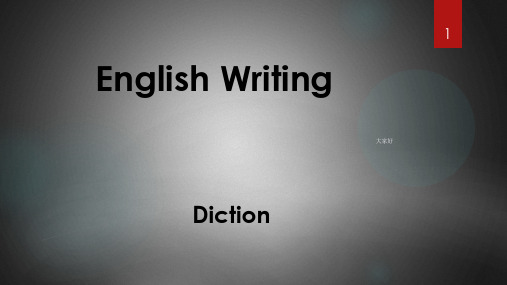
规范英语又可分为口语( spoken language )和书面语 ( written language), 非正式语( informal language)和 正式语( formal language)。例如:
I. Levels of words 5
Formal(big)—of Greek or Latin origin Scholarly or theoretical works Political and legal documents Formal lectures and addresses
大家好
to”. But most of the words he uses are common words.
14
Slang words—highly informal vivid and interesting offensive or funny(when used inappropriately) the first sentence—not sympathetic 大家好 the second one—not serious
Most of the words—common words
When I was a kid, and reading every science fiction 10 book in the local library, I used to wonder exactly how the future would happen. By that I don't mean what the future would be like—science fiction already told me that—but rather how we'd actually get there. Science fiction books seemed to agree, for example, that in the future there would be no money—all transactions would be made via identity cards 大a家n好 d centralized computers. But that seemed dubious to me: how, I wondered, are you going to get everybody to give up money in the first place?
choice of _diction翻译中的选词
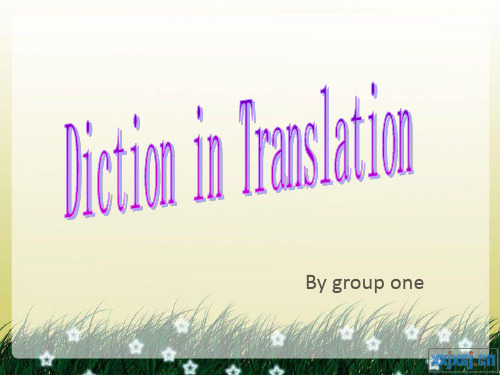
选词的简洁
准确是简洁的前提, 简洁也是准确的保障。英国散文创作 方面的权威都认同“言贵简洁”, 并奉之为圭臬。在 Williams trunk, Jr. 和E. B. White 的The elements of style 一 书中提到: Vigorous writings concise. A sentence should contain no unnecessary words, a paragraph no unnecessary sentences, for the same reason that drawings have no unnecessary lines and a machine no unnecessary parts. 也就 是说任何单词只要不能给句子的内容增添任何新的意义, 就应该被删掉。
cousin堂兄、堂弟、堂姐、堂妹、表哥、表弟、表姐、 堂兄、堂弟、堂姐、堂妹、表哥、表弟、表姐、 堂兄 表妹、 表妹、卿…… president总统、总裁、主席、董事长、议长、会长、 总统、总裁、主席、董事长、议长、会长、 总统 社长、校长…… 社长、校长 carry搬、运、送、提洪、挑,担、抬、背,扛、搂、 搬 提洪、 抱、端、举、夹、捧…… walk, saunter, amble, stride, trudge, shamble, prance, tiptoe ...走 走 machine, engine, plane, aircraft...机 机 sheep, goat, ram, ewe, lamb...羊 羊
Those who do not remember the past are condemned to relive it. 凡是忘掉过去的人注定要重蹈覆辙。 Relive 需要用贬义来表达。
【精品】Unit3Diction9.25翻译理论与实践
3.2 Choice of Contextual Meanings
•Question:
•What is the meaning of Meaning? What is the average number of the meanings for Power?
•意义:指称意义言内意义、语用意义。 •Please determine from the context the exact meaning of Power in each sentence (Drills 3.3, P. 72), and choose an appropriate equivalent one in Chinese.
• 2. Each word when used in a new context is a new word. —Firth
3.4 Choice of Affective Meanings
• Question: • What is the importance of affective meanings to translation? Can you give some examples? • Compare and translate the following:
Translate the following, paying attention to the collocation (Drills 3.4, P. 73). Good (adj.) good manners good humor 得体的举止 愉快的心情;好脾气
a good king
good living
• 实者实,虚者虚,虚非实,实非虚。 • 是即是,非即非…… • ……
Pre-class Questions
Diction
7
How to make a good diction at Wd level?
By knowing:
To choose the right words requires a large active vocabulary. We can not choose the right words if we do not have many words. So we must be well-stored with words, for the bigger the repertory (贮藏) of words we possess, the larger the scope we can choose from. However, a large vocabulary alone is not enough. We must learn some techniques and guidelines for choosing words.
2
Cf. It was the coldest winter for forty-five years. Heavy snow blankets swallowed everything on earth: Villages in the English countryside were cut off and the Thames froze over. Cars crawled along while pedestrians trudged through the deep snow. Horns hoarsened; road accidents shot up. People told jokes about how it was more risky to drive by day than to go boating on the sea at night.
英语写作中的十大常见错误
英语写作中的十大常见错误英语写作中的十大常见错误俗话说“千里之行始于足下”。
英语书面表达能力的形成不是一日之功,必须从平时的课堂学习一点一滴抓起,持之以恒。
下面店铺为大家整理了英语写作中的十大常见错误,希望能帮到大家!一、不一致(Disagreements)所谓不一致不光指主谓不一致,它还包括了数的不一致、时态不一致及代词不一致等。
例:When one have money, he can do what he want to.剖析:one是单数第三人称,因而本句的have应改为has;同理,want应改为wants。
本句是典型的主谓不一致。
改为:Once one has money, he can do what he wants (to do).二、修饰语错位(Misplaced Modifiers)英语与汉语不同,同一个修饰语置于句子不同的位置,句子的含义可能引起变化。
对于这一点中国学生往往没有引起足够的重视,因而造成了不必要的误解。
例:I believe I can do it well and I will better know the world outside the campus.剖析:better位置不当,应置于句末。
三、句子不完整(Sentence Fragments)在口语中,交际双方可借助手势语气上下文等,不完整的句子完全可以被理解。
可是书面语就不同了,句子结构不完整会令意思表达不清,这种情况常常发生在主句写完以后,笔者又想加些补充说明时发生。
例:There are many ways to know the society. For example by TV, radio, newspaper and so on.剖析:本句后半部分"for example by TV, radio, newspaper and so on."不是一个完整的句子,仅为一些不连贯的词语,不能独立成句。
diction
Contents
• 1. Levels of words • 2 The meaning of words • 3. Idioms • 英文写作中怎样避免用词的重复 • 中英语言中用来喻人的植物的差异
1. Levels of words The words that we come across can be divided into 3 types, according to a stylistic point of view: formal, common, and colloquial.
◆ ◆
“huge” is more emphatic than “large”.
• “Modest” and “humble” both indicate a lack of pride, • but “modesty” is a virtue and “humbleness” is not. • “Humble” often connotes undue self-depreciation自我贬低. • So they are different in tone: one is laudatory称赞的 and the other is derogatory贬低的.
In the English vocabulary, only a few thousand words are used by ordinary people in daily communication. These are the most useful words, or common words. They form the core of the English vocabulary which can be used on all occasions.
- 1、下载文档前请自行甄别文档内容的完整性,平台不提供额外的编辑、内容补充、找答案等附加服务。
- 2、"仅部分预览"的文档,不可在线预览部分如存在完整性等问题,可反馈申请退款(可完整预览的文档不适用该条件!)。
- 3、如文档侵犯您的权益,请联系客服反馈,我们会尽快为您处理(人工客服工作时间:9:00-18:30)。
4)…yet, as it sometimes happens that a person departs his life, who is really deserving of the praises the stone-cutter carves over his bones; who is a good Christian, a good wife or a good husband; who actually does have a disconsolate family to mourn his loss;…(W. M. Thackeray : Vanity Fair) ……不过偶尔也有几个死人当得起石匠刻在他 们朽骨上的好话。真的是虔诚的教徒,慈爱的父 母,孝顺的女儿,贤良的妻子,尽职的丈夫,他 们家里的人也的确哀思绵绵的追悼他们;……
The communist agents are still after our military information/ messages. Increasing contact with the West will make their job much easier. 甲: 这是一点小意思,请务必收下. 乙: 你这人真有意思,怎么也来这一套? 甲: 只是意思意思罢了. 乙: 那就不好意思了. A: It is a little gift as a token of my gratitude. Please do take it. B: Aren’t you a little bit too polite? A: Ah, It carries/ conveys my gratitude and affection only. B: Oh, thanks a lot, although I really don’t deserve it.
英语中还有一些习惯用法,在翻译中 容易疏忽或错译,下面是一个很典型的例子。 The importance of a safe spillway cannot be overemphasized. 安全溢洪道的重要性无论怎样强调也不会过分 You cannot pay too much attention to your pronunciation. 译成:你越注意你的发音越好。 You can never be too careful in your work. 在工作中你越细心越好。 One can scarcely pay too high price for liberty. 人对自由付出的代价再高,也不过分。
此外,charge还有如下意义。如charge sb. to do sth.(责令某人做某事),charge oneself with a task (承担一项任务)等。
现代英国语言学派创始人弗斯(Furth)说过: “Each word when used in a new context is a new word.”(每个词用在不同的句子中 就有不同的含义。)苏联翻译理论家巴尔胡 达罗夫也主张“多义词的意义通常是通过 言语的上下文来揭示的”。作者使用多义 词究竟指多义中的哪一义,只能从上下文 中去寻找。尤其是遇到常用词时,不要自 以为对它们已很熟悉,想当然地把自己已 懂得的词义放到译文中去。须知,译者自 以为懂了而实际又不懂的地方,往往最容 易译错。
1) This general was charged with treason.. 这个将军被指控犯了叛国罪。 2) The Committee decided to put Professor Henry in charge of the research work. 委员会决定让亨利教授负责这项研究工作。 类似短语有take charge of, take charge译为“负 责” 3) As soon as the moment for the general offensive arrived, the soldiers charged the enemy position bravely. 总攻时间一到,战士们勇猛地向敌人的阵地冲去。 4) She complained that she had been charged too much. 她抱怨说,向她收的费太高了。
其次,在英语中还存在着一个词的单数和 复数意义全然不同、前后搭配不同而意义 不同等情况。兹举例如下:
A.单复数的词义不同 Ninety 90(单) nineties 90年代(复) time 时间(单) times 时代,此书,倍数(复) finding 发现,探索(单) findings 研究成果,调查结果(复) work 工作,功(单) works 工厂,著作,工事(复)
要正确地选择和确定词义, 从以下三个方面着手 : (一)根据词性确定 词义
例:(1) The enemy’s scheme went bankrupt; (2) We have mapped out a scheme. scheme在这两句话中有不同的感情色彩和褒贬含义, 应分别译为“阴谋”和“计划”。 另外,英译汉时,我们常常会遇到这样的情况:有些词 在辞典上找不到适当的词义,如照搬硬译的话,会使译文生 涩难懂,甚至与原义相悖,造成误解。此时应在理解该词原 义的基础上,结合语篇意思,加以引申,选择最为贴切的汉 语词语来表达。如: 例:She sailed into the room.她仪态万方地走进屋子。 例:The Great Wall is a must for most foreign visitors to Beijing.对大多数游览北京的外国游客来说,长城是必不可少 的参观项目。
英语单词good 是个虚指的抽象词语;在不少情 况下,可以用它的基本词义“好”来翻译,如a good man(一个好人),a good book(一本好书), good news (好消息) 等,但是,比较正规的书面 语体里就不能一味用“好”字来翻译good 一词 了。例如:
1) It was a girl with good manners. 这是一位举止得体的姑娘。 2)These were all labeled as good eggs. 这些都被标为新鲜的鸡蛋。 3)Dogs are often regarded as man’s good friends. 狗经常被认为是人们的忠实朋友。
B.前后搭配词不同词义不同
轻柔的音乐 软木 不含酒精的饮料 柔光 文火 和蔼的话 毛织品 软水(不含矿 物盐类的水) heavy current 强电流 heavy cut 深挖方 heavy industry 重工业 heavy line 粗线 heavy mortar 稠浆 heavy rain 大雨 heavy traffic 交通拥挤 heavy weathering 严重风化 soft pillow soft cushion soft money soft breeze soft voice soft hat soft answer soft heart
例:Capitalism cannot cure itself of its destructive internal contradiction. 直译:资本主义医治不了它本身的毁灭性的内在矛盾。“Cure”一般 译为“医治”。但“医治”与“矛盾”搭配不当。翻译时需要根据中文 的习惯改为“消除”。 例:He halted in the district where by night are found the lightest street, hearts, vows and librettos. (译文1)他到了一个市区才停步,在那里晚上有最轻的街道,最 轻的心情,最轻的盟誓和最轻的歌曲。 (译文2)他到了一个市区才停步,在那里晚上有最明亮的街道, 最愉快的心情,最轻易出口的盟誓和最轻松的歌曲。
1)I want my martini dry. 我的马丁尼酒不要甜的。 2) There are still some dry states in the United States. 在美国尚有几州禁酒。 3) She prefers dry bread. 她喜欢无奶油的面包。 4) He cows are dry. 这些母牛缺奶。 5)He gave us a dry lecture yesterday. 昨天他给我们作了一个枯燥无味的讲演。 6) I am sure what he presented was a dry fact. 我确信,他所列举的是铁一般的事实
1)Here is a pretty go! 这件事真难办! 2)He is itching to have a go at it. 他跃跃欲试。 3)The old man is still full of go. 这位老人仍然精力充沛。 4)These brightly colored stockings are all the go this summer. 这些颜色鲜明的袜子今夏很流行。
Lecture 5 Diction
Words have no meanings, people have meanings for them. Good translation depends largely upon how to choose the exact meaning of key words.
在英汉翻译过程中,针对原文的
词义正确地选择汉语词义,是保 证译文质量的根本一环。
首先一个词在不同的句子中有不同的含 义。
Hehe dinner cost us five dollars a head. Prick with the head of a needle. He was standing at the head of the staircase. Let’s discuss the question under the five heads. The head of his bed was pilled with books. Present at the meeting were the heads of government of the four countries.
